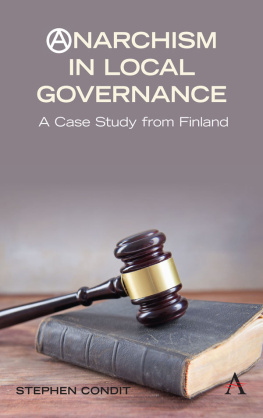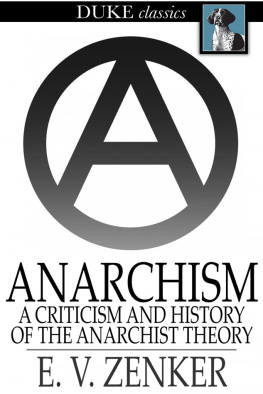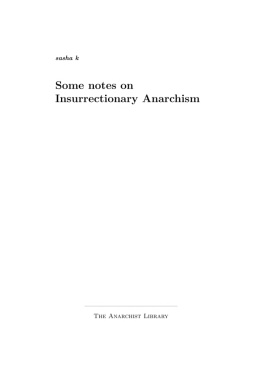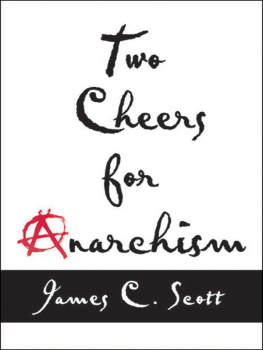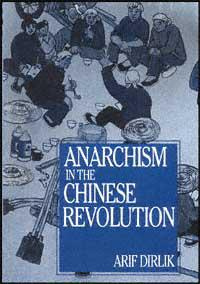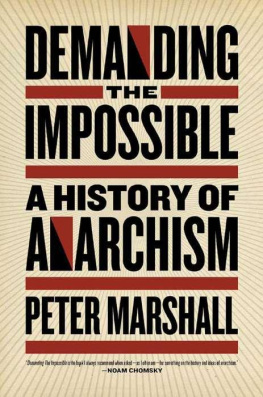Anarchism in Local Governance
Anarchism in Local Governance
A Case Study from Finland
Stephen Condit

Anthem Press
An imprint of Wimbledon Publishing Company
www.anthempress.com
This edition first published in UK and USA 2019
by ANTHEM PRESS
7576 Blackfriars Road, London SE1 8HA, UK
or PO Box 9779, London SW19 7ZG, UK
and
244 Madison Ave #116, New York, NY 10016, USA
Stephen Condit 2019
The author asserts the moral right to be identified as the author of this work.
All rights reserved. Without limiting the rights under copyright reserved above, no part of this publication may be reproduced, stored or introduced into a retrieval system, or transmitted, in any form or by any means (electronic, mechanical, photocopying, recording or otherwise), without the prior written permission of both the copyright owner and the above publisher of this book.
British Library Cataloguing-in-Publication Data
A catalogue record for this book is available from the British Library.
ISBN-13: 978-1-78527-075-8 (Hbk)
ISBN-10: 1-78527-075-3 (Hbk)
This title is also available as an e-book.
For the citizens of Savonlinna, who sustain a good community, the municipal officials who serve them and the local politicians who represent them.
CONTENTS
Of my numerous intellectual debts I must mention the following, to represent all the others. In Berkeley: Gene Lunn, for enticing me into the disciplines of anarchism; Jim Burnett, for demonstrating the responsibilities of practical participation; in London: John W Burton, for developing alternatives to power; and in New York: Brian Kates, for his experienced wisdom in helping me through the emotional turbulence of this project. I thank also the staff of Anthem Press for their assistance in producing this book.
In the spring of 2017, I lost re-election to my seventh consecutive, four-year term on the city council of Savonlinna, Finland, thereby curtailing my career as a local politician. Savonlinna is a small industrial city in an economically depressed region of eastern Finland, located in the infrastructurally difficult and ecologically sensitive Saimaa archipelago. It is increasingly dependent on tourism, although its strategy prioritises investment in environmental technology, with some success. The municipality has high unemployment and is relatively disadvantaged on nearly all social indicators. It has regularly incurred budget deficits, leading to continual cutbacks in social, educational, environmental and recreational services. Nevertheless, it sustains a vigorous cultural life, most notably the internationally renowned opera festival. Recorded levels of citizen satisfaction are consistently satisfactory.
During my tenure, I have served at various times on the culture, environment, technical and education committees and numerous working groups, and chaired my partys council faction for over 18 years. Presently, I am on the scrutiny and auditing committee, as well as being an alternative member of the council. I have held a number of elected posts in my political party, the Green League, at local, regional and national levels, including 10 years on the national central committee and six years on the national council. For an even longer period, I have been active as a member of steering committees or as chair in numerous citizen associations of civil society, dealing with such matters as environmental and nature protection, environmental education, human rights, school and university governance, international and sustainable development, culture and science, land use and urban planning as well as the development and internal cooperation of the third sector. Throughout my career, I have considered myself an anarchist and publicly declared so. In this context, I seek a tentative justification of my participation in the municipality and its civil society. My focus is not so much my contributions to local governance but rather my reasons and purposes as acknowledgement of a personal obligation to nudge public policy towards anarchist praxis. Insofar as my justification is valid, it may indicate spheres of anarchisms ideals which are now obscured by the complexities of local governance and the hostility or indifference of many anarchists to it.
Because of the recurrent conflicts of citizen associations with the municipality, and my frequent stance of opposition to municipal policies and council decisions, I consider these two complementary dimensions of my public career to be a coherent whole. In both state and municipal roles, and similarly in civic activism, I have understood my purpose to be committed to the strengthening of civil society and the accountability of , 127), it may have a similar effect of encouraging public authorities to seek a legitimacy they might otherwise take for granted or disdain. In spite of Finlands history of the state fostering civil society for its interests, I have assumed and sought to enhance the independence of citizen associations from statist interests.
My account is not based on what I have achieved or on the consequences of my actions. My successes have been modest and infrequent, and my consequences difficult to assess. I propose, instead, to focus on what I have intended to promote and the values which I have sought to express, always implicitly, often explicitly and, on occasion, vociferously. At the heart of these values is anarchism. In spite of the restrictiveness of municipal and associational participation, I consider myself an anarchist. Certainly, I am not of the fiery sort. Neither my temperament nor my situation would abide militancy. I seek to espouse what McLaughlin describes as a weak but engaged philosophical anarchism, which enjoins me to a duty to act for purposes intrinsic to anarchism with neither the absolutism of dogma nor the quietism of conformist obedience (McLaughlin , 13). There is space in civil society and the public sector between these alternatives. But the compatibility of my public career with even weak anarchism is uncertain, and so my declaration of anarchist principles may be contestable.
I am venturing a defence of soft anarchism, not only as a heuristic device to set standards for ruling liberal institutions, but also as an engaged praxis with and in them. This may, as Roxburgh argues, entail a tacit or explicit recognition of the priority and legitimacy of the liberal state, thereby sacrificing anarchisms definitive purpose of opposition to the state and commitment to its abolition (Roxburgh , 5564). She assumes that any engagement with ruling liberal institutions will result in liberalisms co-optation of anarchist praxis, severing it from anarchisms transformational purpose and contributing to the construction of a liberal discourse of anarchism which in effect co-opts and dilutes the radical critiques of anarchism. Anarchism is negated in both theory and praxis. I cannot gainsay this risk. Nevertheless, I consider it a diminution of anarchism to dogmatic anti-statism which ill serves the needs of public policy. Anti-statism is a deficient anarchist ideal and too often a futile or destructive purpose of participation. When dogmatically adhered to, it weakens the praxis of transformational prefiguration which can further the self-governance necessary to anarchism. Contrary to Roxburgh, I hold, or perhaps hope, that anarchist thought and praxis can be enriched in and for the municipality.
The Finnish system of local government is statist. Its units, municipalities, communes and regional provinces have been created and are considerably funded by the state, on top of local income and property taxes, which are also circumscribed by national statutes. The state stipulates most of their statutory functions. Nevertheless, local governments have some latitude in determining how they discharge these functions and which non-statutory ones they assume. Local self-government is guaranteed by the constitution and jealously guarded by local officials and politicians. For several years, however, the state has pursued a number of policies to reduce both the number of local government districts and their functions, most notably in integrated social and health services. Most of these had previously been delegated by the local governments to federations of several municipalities and communes, in which case the reality of local self-government has already been much attenuated. A new system now being formulated, if and when it is implemented, will transfer many of these public functions to provincial governments, also with elected councils and possibly with powers of taxation. Statist public policy will be regionalised. The impact on local governments is unpredictable. The problems and prospects of anarchist participation, however, will remain the same, albeit perhaps weakened somewhat to the extent that regional provinces do not express or elicit the communality typical of local governments.

